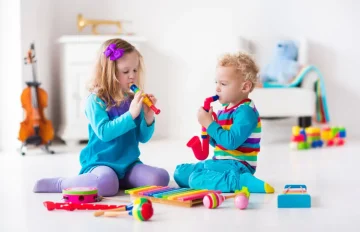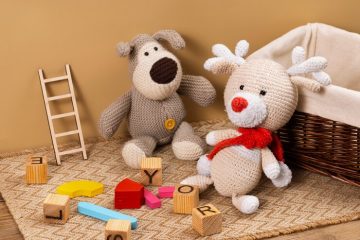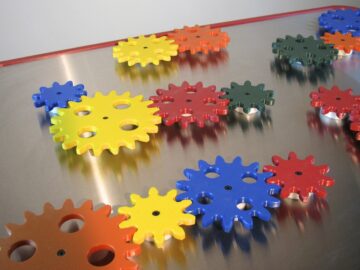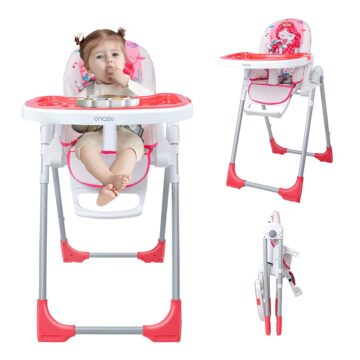
Musical toys are not just fun and engaging; they play a crucial role in the development of young children. These toys can significantly impact various aspects of a child’s growth, from cognitive development to social skills. In this article, we will explore the myriad benefits of musical toys in early childhood, illustrating why they are an essential part of any child’s playtime.
Cognitive Development
Enhancing Memory Skills
Musical toys often involve repetitive patterns and sequences. When children engage with these toys, they practice and improve their memory skills. For instance, learning the sequence of notes in a simple song helps to strengthen a child’s ability to remember and recall information.
Boosting Mathematical Understanding
Rhythm and melody inherently involve patterns, which are fundamental to mathematics. By playing with musical toys, children begin to understand these patterns, which can later translate into better mathematical skills. Recognizing beats and rhythms is akin to identifying sequences and structures in math.
Language and Communication
Improving Vocabulary and Pronunciation
Musical toys that include songs or spoken words can significantly enhance a child’s vocabulary and pronunciation. Singing along with these toys allows children to practice new words and sounds in a fun and engaging way. This can lead to a more extensive vocabulary and better speech clarity.

Encouraging Expressive Language
When children play with musical instruments, they often create their own songs and rhythms. This creative process encourages them to express their thoughts and feelings verbally, fostering their expressive language skills. They learn to articulate their ideas and emotions through music.
Emotional and Social Development
Building Emotional Awareness
Music has a profound effect on emotions. Playing with musical toys allows children to explore and express their feelings. They learn to recognize different emotions associated with various types of music, which can help them develop emotional awareness and empathy.
Fostering Social Interaction
Musical toys can be a great way for children to interact with others. Group activities involving musical toys, such as forming a small band, can teach children important social skills like cooperation, sharing, and taking turns. These interactions are essential for developing healthy relationships.
Physical Development
Enhancing Fine Motor Skills
Playing musical instruments requires precise movements. For example, pressing keys on a piano or strumming the strings of a guitar helps develop fine motor skills. These activities improve hand-eye coordination and dexterity, which are important for many daily tasks.
Promoting Gross Motor Skills
Larger musical toys that involve dancing or movement can help children develop their gross motor skills. Dancing to music improves balance, coordination, and spatial awareness. It also provides a fun way for children to be physically active.
Creativity and Imagination
Stimulating Creative Thinking
Musical toys inspire children to use their imagination and creativity. Whether they are composing their own tunes or inventing new ways to play with the toys, children are constantly engaging their creative minds. This stimulation is crucial for developing problem-solving skills and innovative thinking.
Encouraging Artistic Expression
Through music, children can express themselves in unique and personal ways. Musical toys provide an outlet for artistic expression, allowing children to convey their feelings, ideas, and personalities through the medium of sound. This form of expression can boost their confidence and sense of self.
Choosing the Right Musical Toys
Age-Appropriate Options
When selecting musical toys, it’s important to choose those that are appropriate for your child’s age. Younger children may benefit from simple, colorful instruments like maracas or tambourines, while older children might enjoy more complex toys like keyboards or xylophones.
Safety Considerations
Ensure that the musical toys you choose are safe for your child. Look for toys made from non-toxic materials and those that do not have small parts that could pose a choking hazard. It’s also important to consider the volume of the toy to protect your child’s hearing.
Integrating Musical Toys into Daily Life
Making Music a Part of Routine
Incorporate musical toys into your child’s daily routine to maximize their benefits. For instance, you can have a designated music time each day where your child can explore and play with their musical toys. This regular exposure can reinforce the skills they are developing.

Encouraging Family Participation
Get the whole family involved in musical activities. Family sing-alongs or musical games can be a fun way to bond and create lasting memories. It also shows your child that music is a valuable and enjoyable part of life.
Long-Term Benefits
Academic Success
Studies have shown that children who are exposed to music from an early age tend to perform better academically. The skills developed through musical play, such as memory, pattern recognition, and emotional regulation, are all transferable to academic learning.
Lifelong Love for Music
Introducing musical toys early can instill a lifelong love for music. Children who grow up with positive musical experiences are more likely to continue enjoying and participating in musical activities as they grow older. This can lead to a lifelong appreciation and engagement with music.
Conclusion
Musical toys are much more than simple playthings; they are powerful tools that can contribute to a child’s development in numerous ways. From cognitive and language development to emotional and social skills, the benefits of musical toys in early childhood are vast and varied. By incorporating these toys into your child’s daily life, you can support their growth and foster a love for music that will last a lifetime.
For a wide range of high-quality musical toys, visit Chunnumunnu. Our selection is designed to provide children with the best opportunities for learning and fun through music.
















